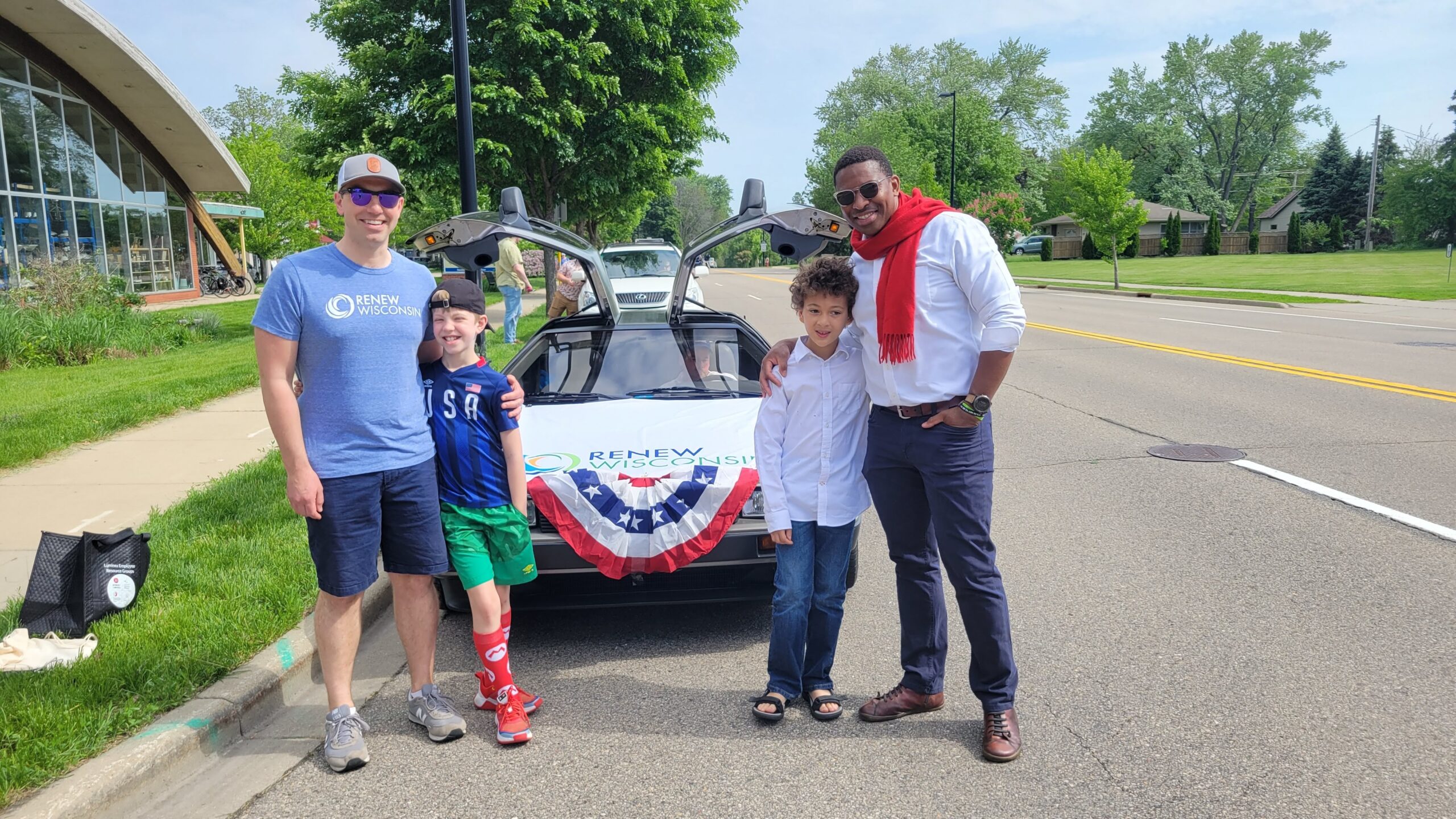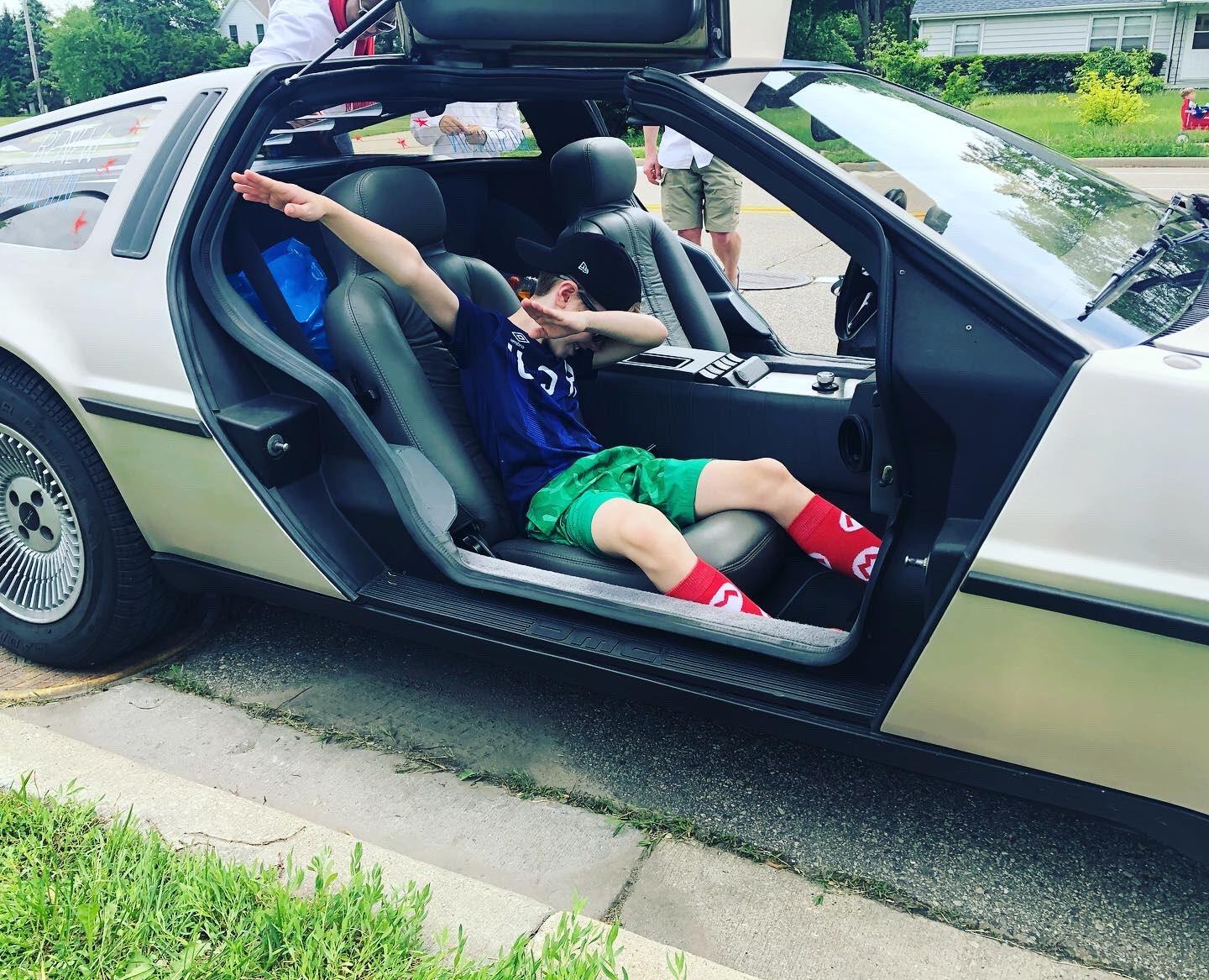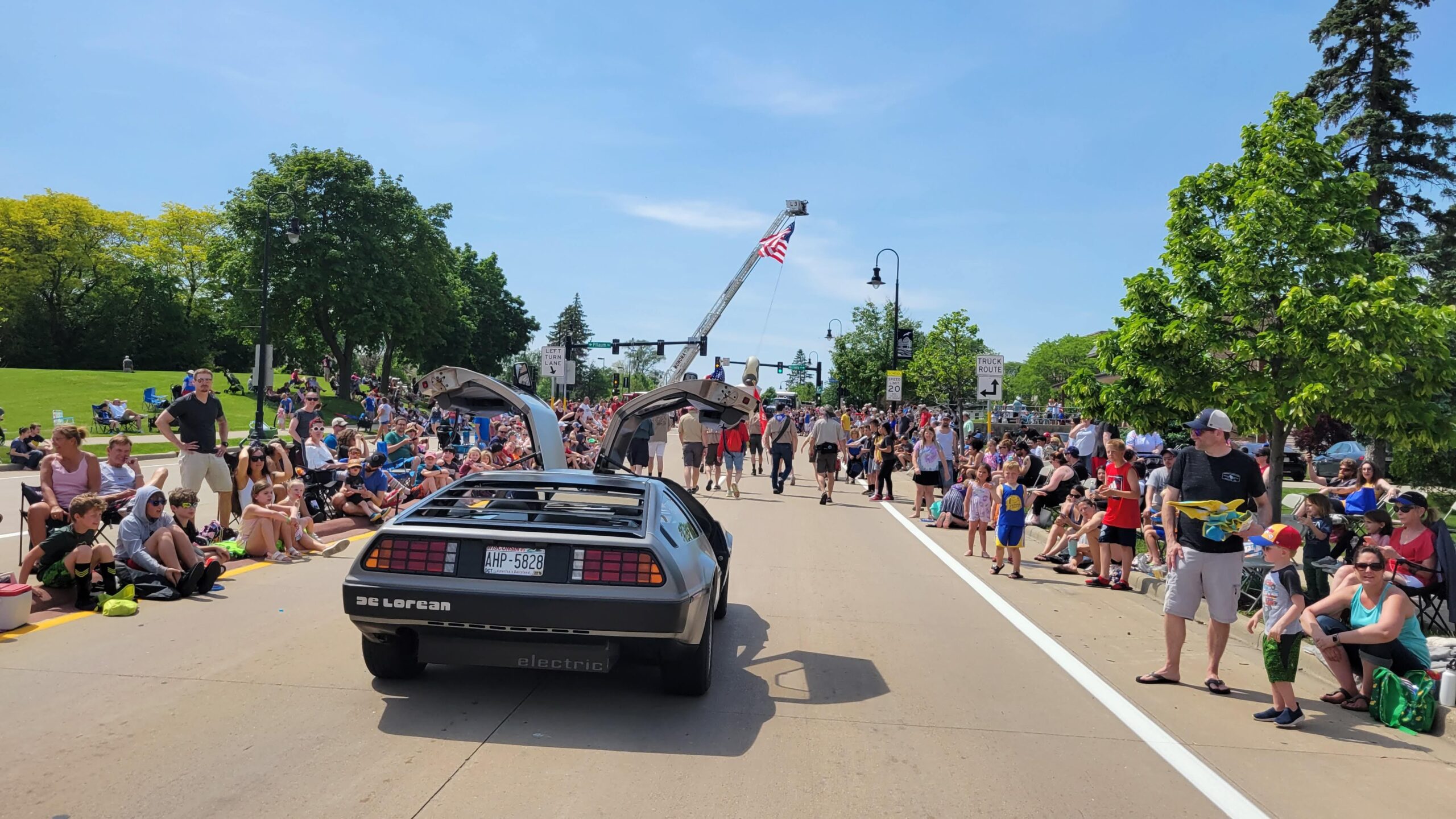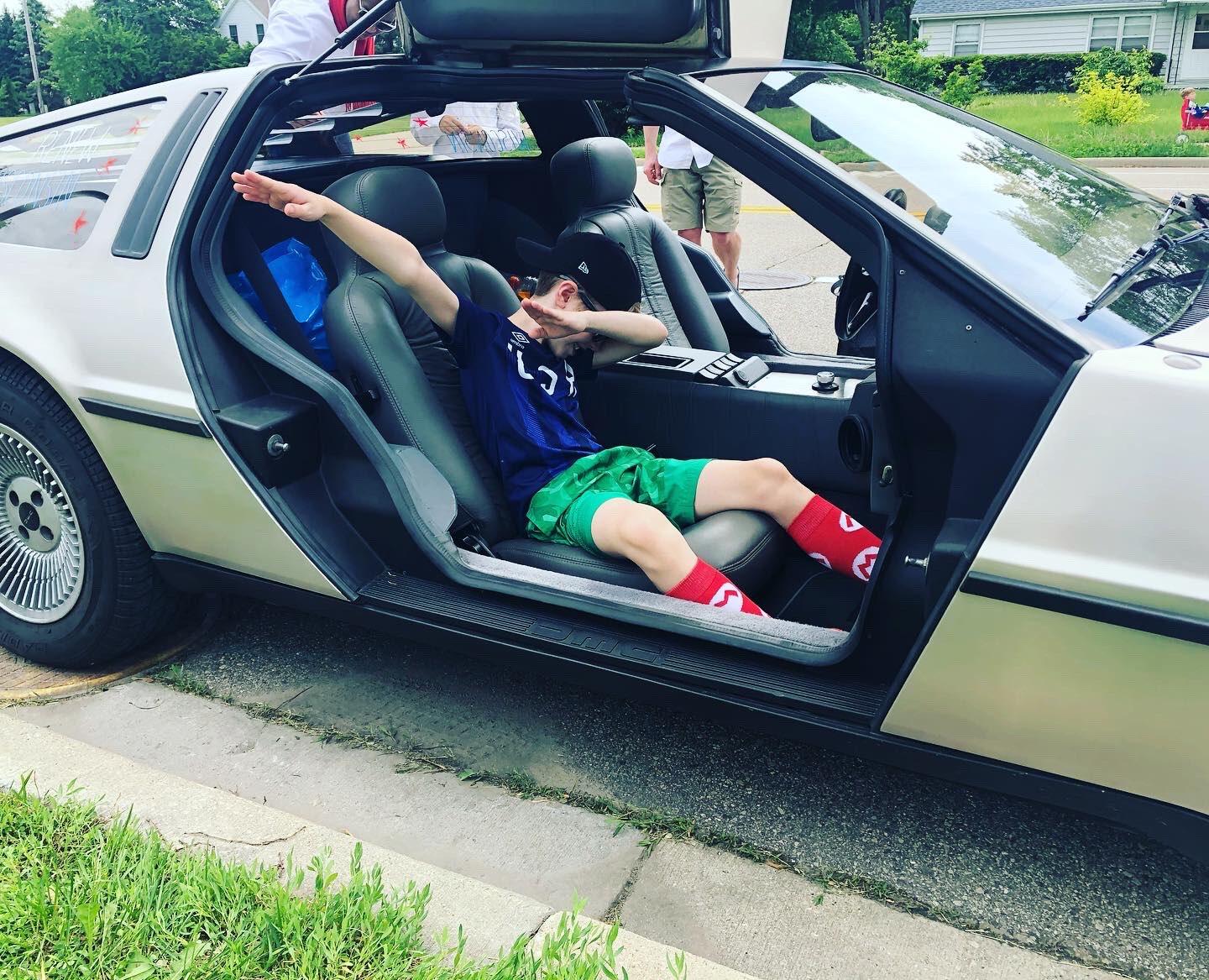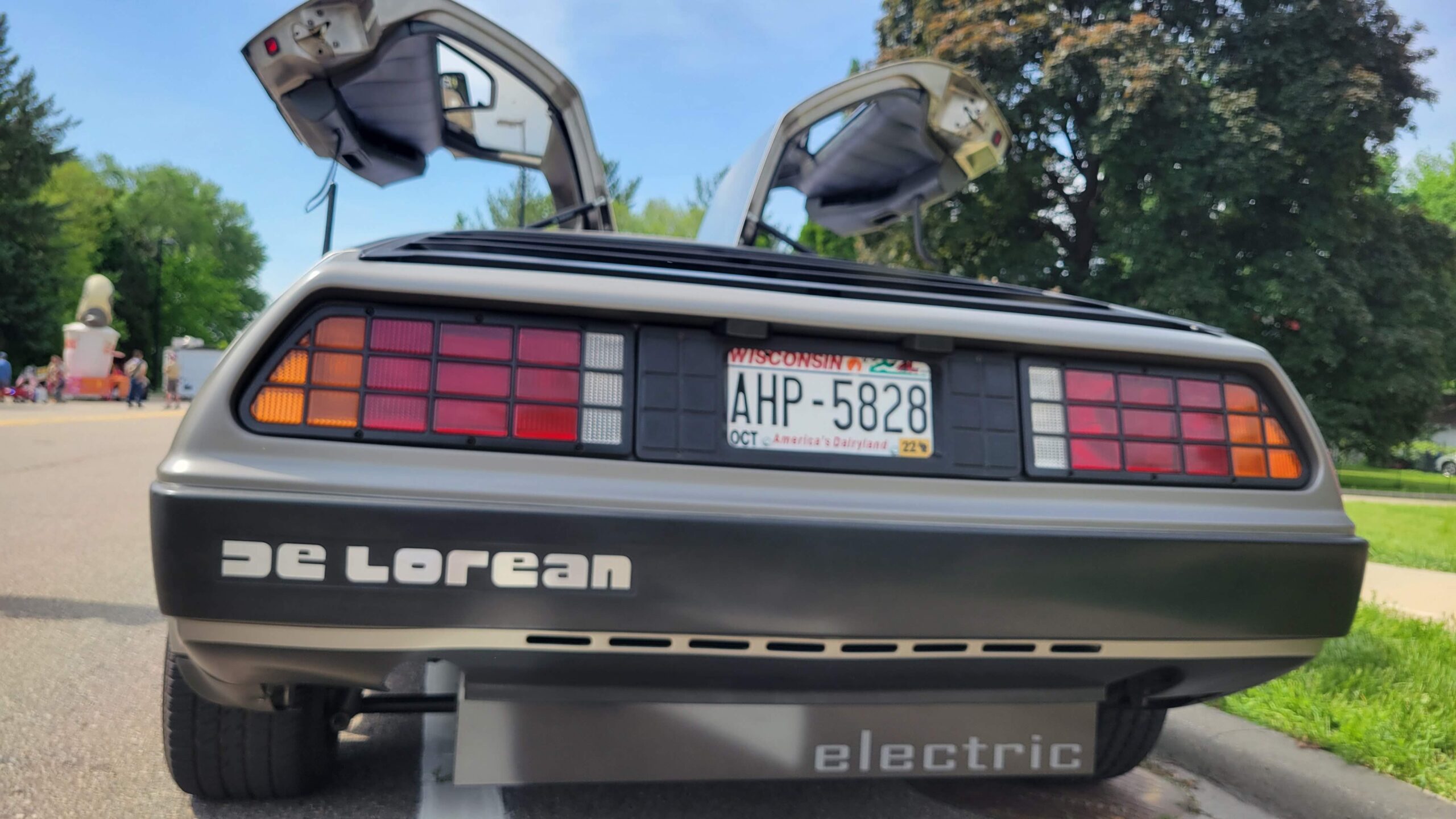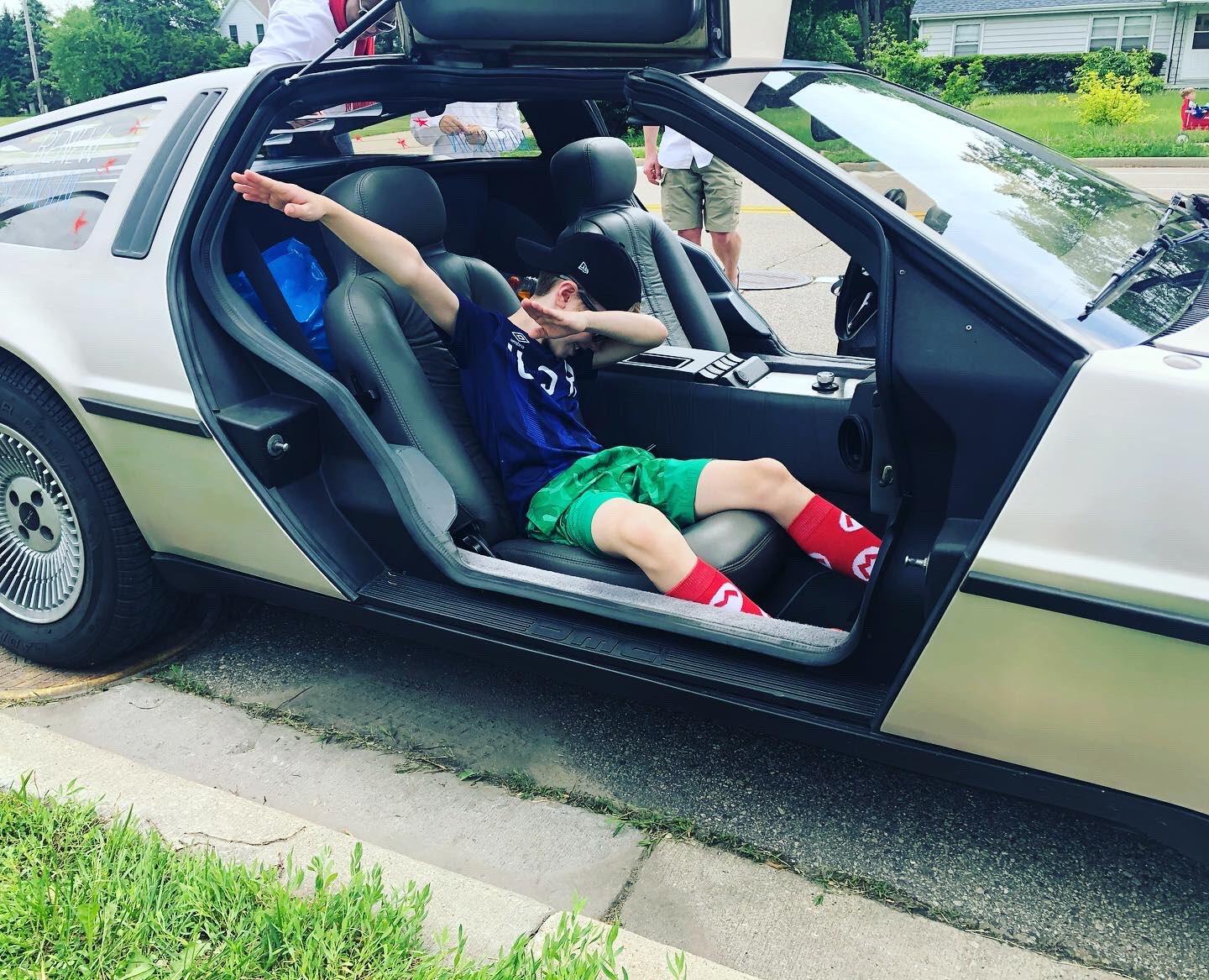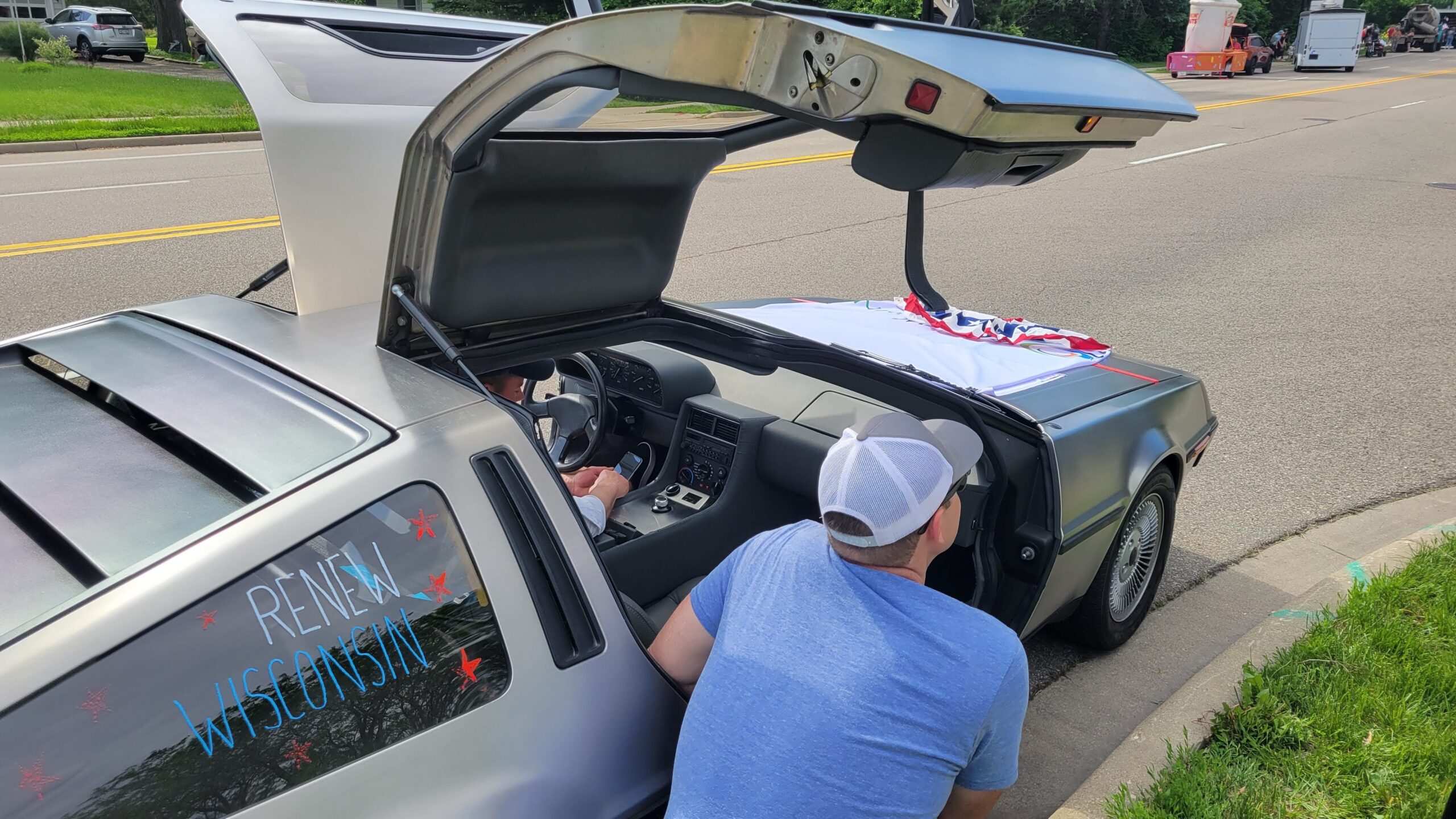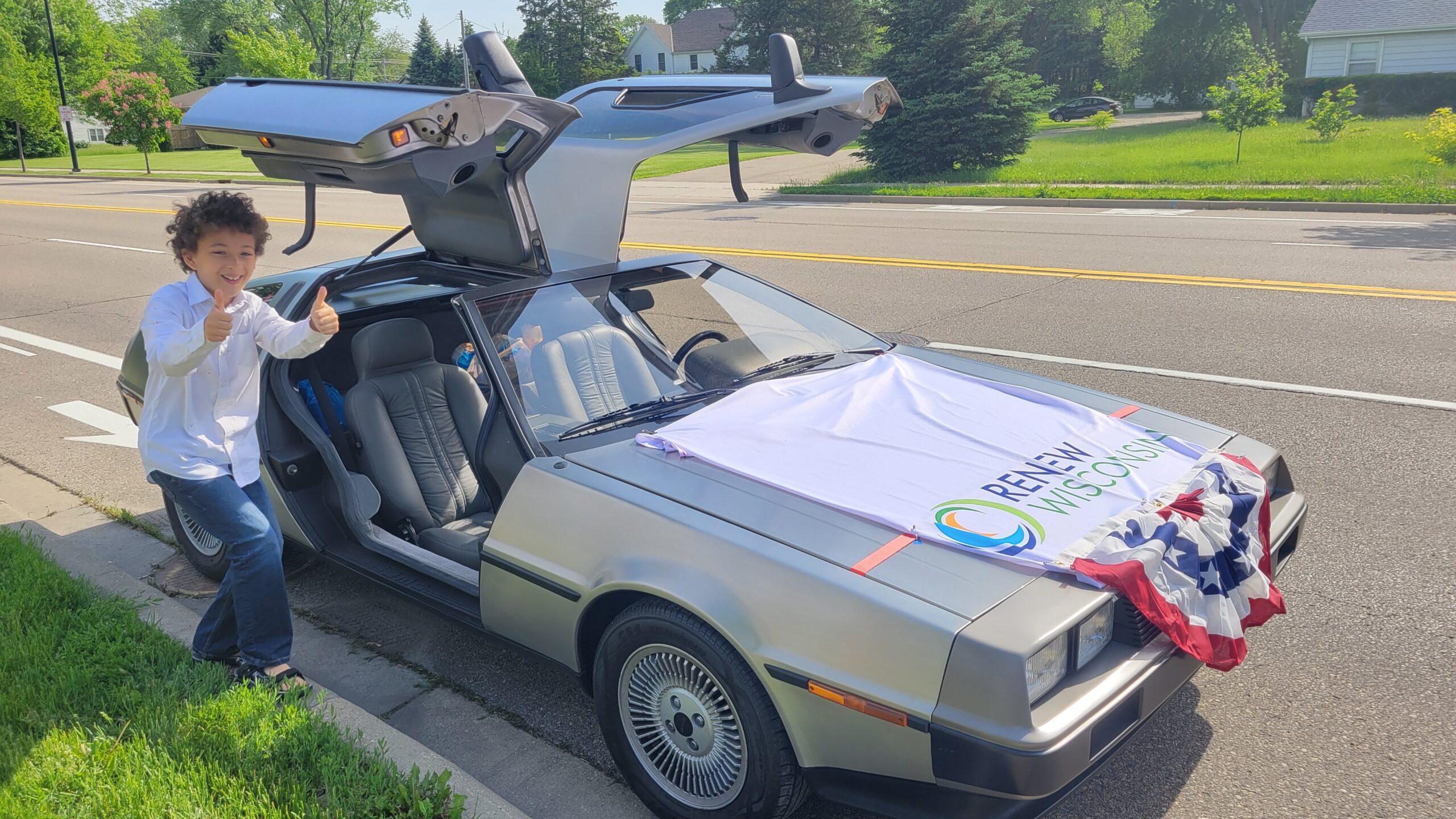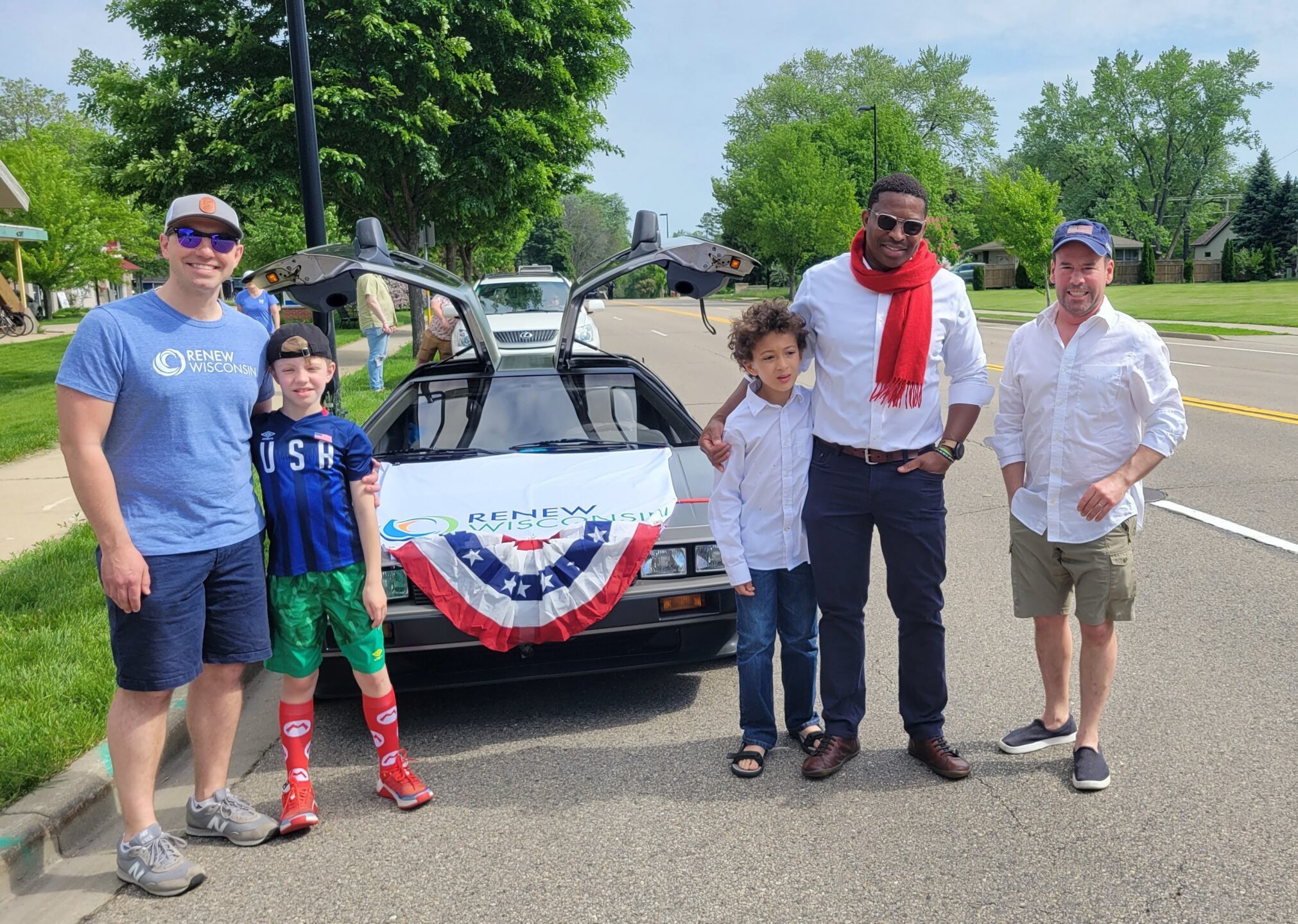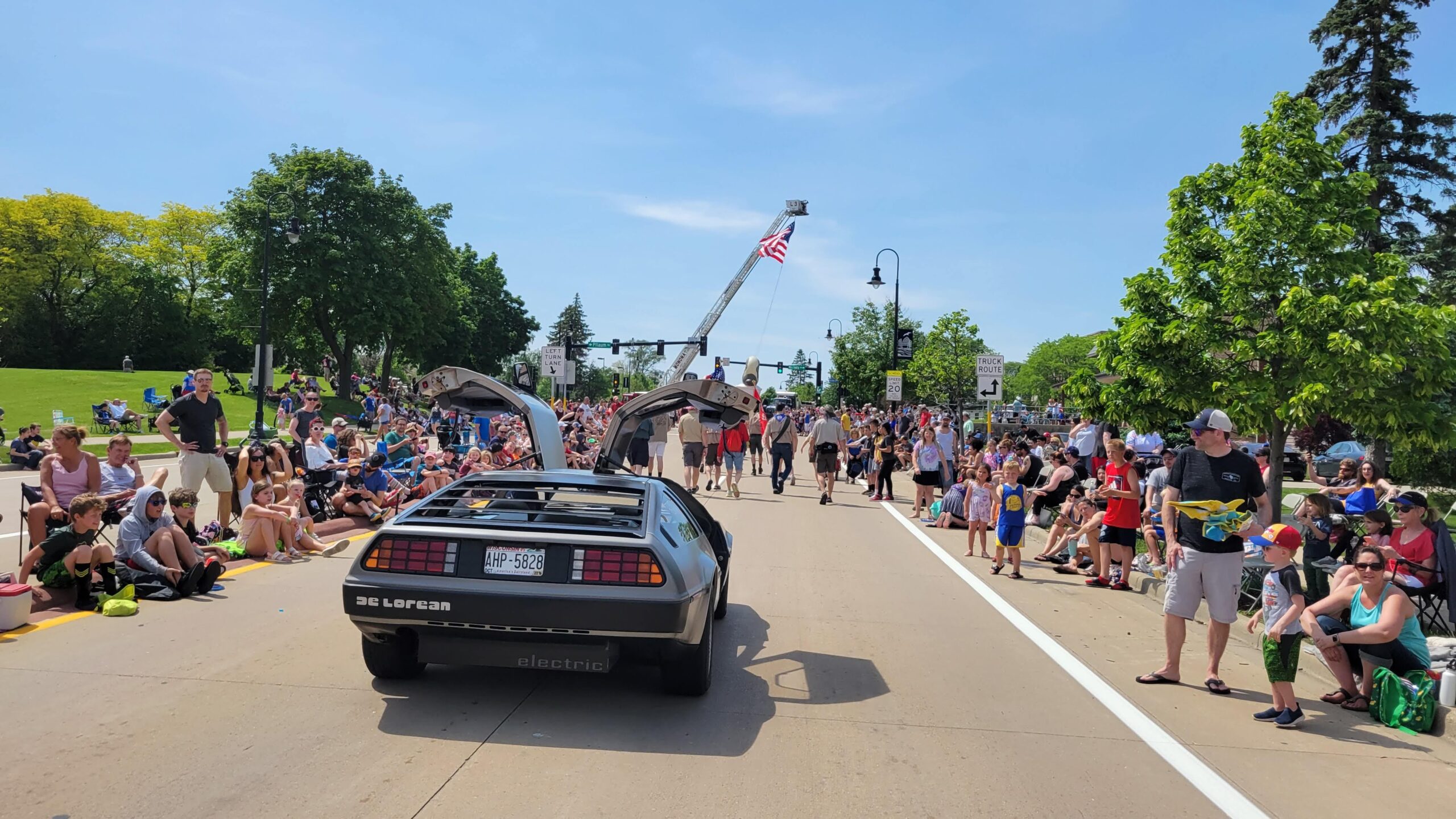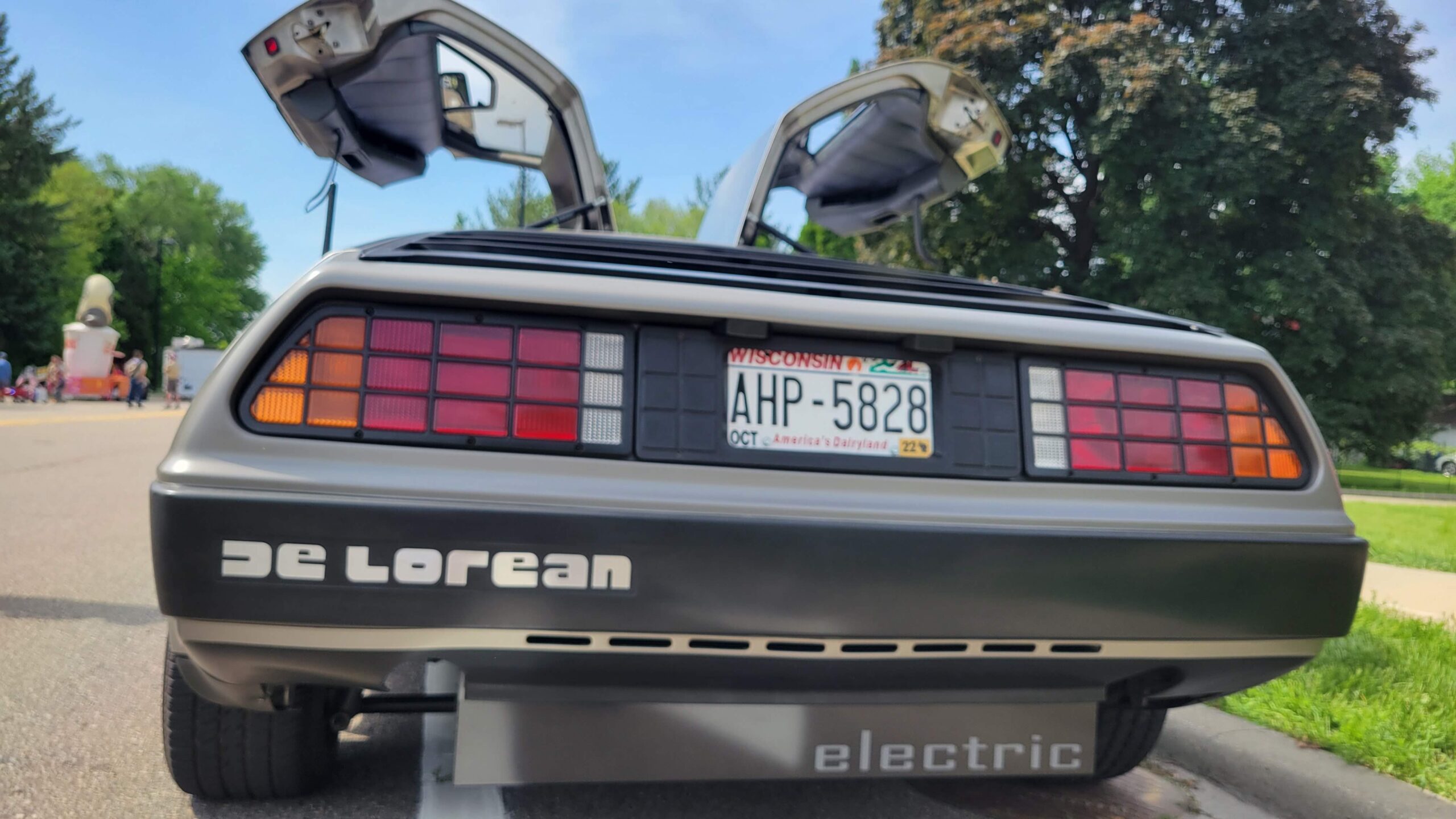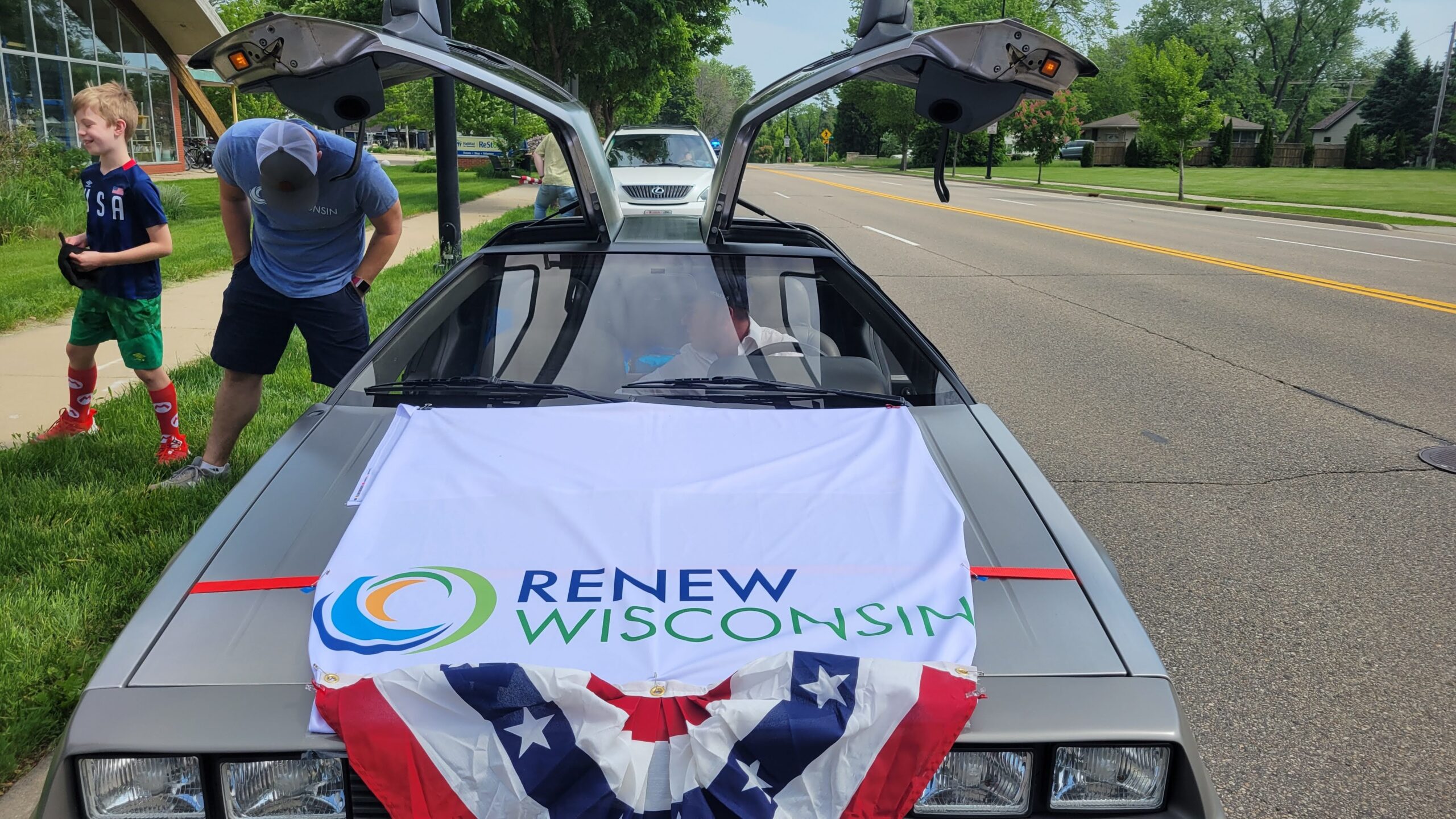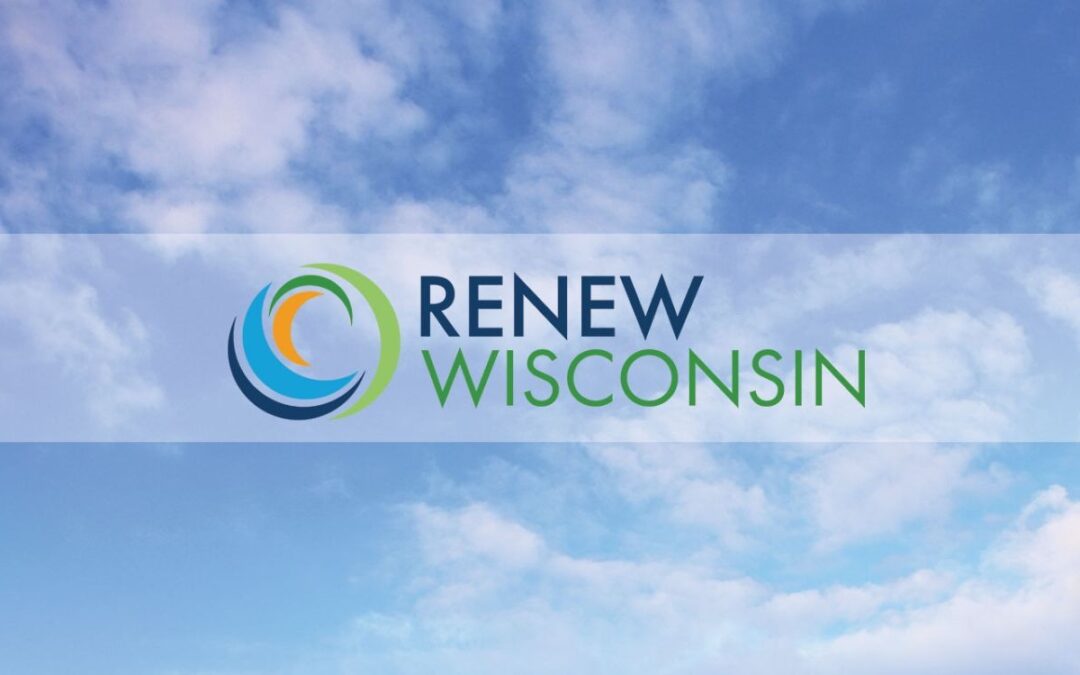
by Jodi Jean Amble | Jul 21, 2022 | Community, RENEW Wisconsin
Thank you to all members who voted in our 2022 Board of Directors Election. RENEW Wisconsin’s Board of Directors plays an important role in setting the strategic vision for the organization. All dues-supporting members of RENEW Wisconsin were invited to vote in this year’s Board of Directors election.
The results of this year’s election include two incumbent board members, Mike Barnett and Jim Funk, and two newly elected board members, Lauren Reeg and Melissa Warning. All will soon begin a three-year term helping us advance renewable energy in Wisconsin.
MEET OUR NEWLY ELECTED BOARD MEMBERS
LAUREN REEG
RENEW Wisconsin is at the forefront of clean energy policy, and I would be proud to sit on the Board of directors. I have extensive experience with Wisconsin energy policy that could aid RENEW’s efforts.
Having lived in Wisconsin for over a decade, I received my Bachelor’s in engineering and Masters in energy policy from UW-Madison while interning at RENEW for two years. Currently, I work for RMI, a national clean energy non-profit focused on building decarbonization and electrification policy in the Midwest.
I’ll bring my knowledge of federal funding for equitable building retrofits, expertise in technical analysis related to cold climate heat pumps and renewable energy, and a national understanding of building policy efforts. These skills can elevate RENEW’s ability to engage in the buildings sector, which is ~17% of WI’s energy-related emissions. In addition to skills from my current role, I have experience in Wisconsin regulatory dockets and EV analysis and policy.
Finally, I am personally interested in sitting on the Board because I deeply care for RENEW. My internship with RENEW launched my career and cemented my passion for Midwest energy policy. This organization does exemplary advocacy, stakeholder engagement, and education that I would be proud to support.
MELISSA WARNING
I would like to become a Board of Director member at RENEW Wisconsin to help drive clean energy initiatives forward in our state. I am passionate about the impact renewable energy and electrification can and will have. There’s significant work to be done in our state to educate key stakeholders as to why the Badger State needs to continue innovating and investing in a future that is not dependent on fossil fuels.
Our future depends on our actions now, and collectively, we need to strategize what options are available today and how we knock down barriers to help build a stronger, cleaner, more vibrant Wisconsin.
As electrification becomes more prominent as an alternative energy source, we must ensure we have the resources to support those efforts. It’s up to us to push for cleaner, more reliable power for people and businesses across the state. Renewable energy options need to become a larger part of the conversation. Change is difficult but necessary as we move towards a decarbonized, decentralized, and digitized energy future.
I am currently the Sr. Marketing Strategy Manager for EnTech Solutions, a full-solution clean energy company, where I lead the strategic marketing initiatives for the business. I am passionate about brand building by understanding trends and authentically connecting with consumers through education and value creation. I have 12 years of experience in marketing strategy, content development, project management, and social media strategy. Before joining EnTech Solutions, I was with Harley-Davidson and Kimberly-Clark.
I hold a Communications/Public Relations degree from the University of Wisconsin – Stevens Point and an MBA from the University of Wisconsin – Milwaukee. I reside in Oshkosh and enjoy spending time with my family, being outdoors, and traveling.
RENEW BOARD OF DIRECTORS
Mike Barnett • Madison, WI
Mike Cornell • Hartland, WI
Beth Esser • Madison, WI
Jim Funk • Winneconne, WI
Samara Hamze • Stevens Point, WI
Alicia Leinberger • Viroqua, WI
Mariah Lynne • Albert Lea, MN
Jessica Niekrasz • Chicago, IL
Lauren Reeg • Boulder, CO
Amy Seeboth-Wilson • Platteville, WI
Josh Stolzenberg • Wausau, WI
Eric Udelhofen • Madison, WI
Ken Walz • Madison, WI
Melissa Warning • Oshkosh, WI
Niels Wolter • Madison, WI
Don Wichert (DIRECTOR EMERITUS/Lifetime/Non-voting) • Madison, WI
Thank you for participating in the election and using your voice to help shape RENEW’s future! And thank you to all candidates who offered their expertise and time to help our organization grow and thrive.
RENEW Wisconsin
RENEW Wisconsin holds elections for our Board of Directors every year. If you or someone you know would like to be considered for our next election, please complete the short form linked below. Racial diversity and inclusion are a priority in our organization, and we strongly encourage people of color and other underrepresented groups to join us in advancing renewable energy in Wisconsin.
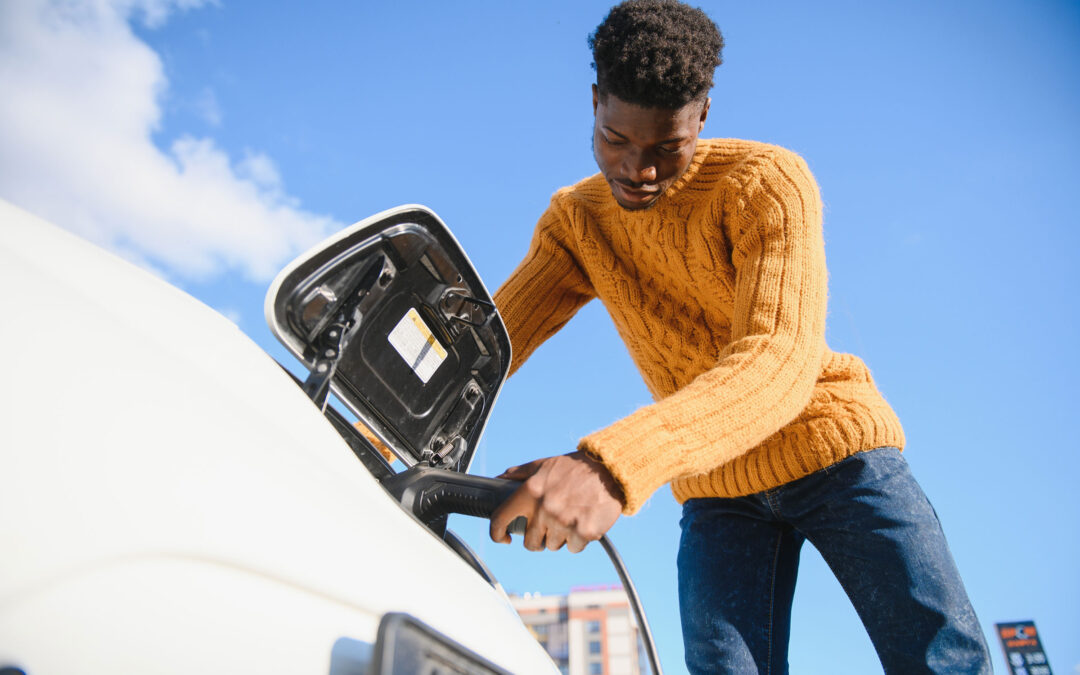
by Francisco Sayu | Jul 20, 2022 | Community, Electric Vehicles
See how the state plans to spend these funds.
The Wisconsin Electric Vehicle Infrastructure (WEVI) Plan is Wisconsin’s version of the National Electric Vehicle Infrastructure (NEVI) Plan – a Bipartisan Infrastructure Law (BIL) program signed by the Biden administration last year. The NEVI program provides funding to states to strategically deploy electric vehicle (EV) charging stations to facilitate access and reliability. The programs must also support the Justice40 Initiative, which states that at least forty percent of federal investments in climate and clean energy infrastructure benefits are distributed to disadvantaged communities.
The Wisconsin Electrification Initiative (WIEV) within the Department of Transportation (WisDOT) is ready to finalize its plan, which outlines how Wisconsin will spend the $78.65 Million of available funding to build, operate and maintain Electric Vehicle (EV) charging stations in the State. This funding is part of a $7.5 billion package to create a national network of 500,000 EV chargers by 2030.
The NEVI funding will be distributed over five years (2022 – 2026). The first round of funding will prioritize the development of EV charging stations every 50 miles along the State’s portions of the Interstate Highway System within one travel mile of the Interstate. The new charging stations must have at least four EV fast charging ports.
The NEVI program also allocates $2.5 billion for discretionary grants to support charging stations along Alternative Fuel Corridors (AFCs) and community charging grants. The Joint Office of Energy and Transportation will provide additional guidance for discretionary grants in Fall 2022.
WisDOT has opened the Wisconsin Electric Vehicle Charging Infrastructure Plan for public input. Wisconsin residents are encouraged to send comments and feedback using this link by July 24, 2022.
Wisconsin’s EV infrastructure plan is thorough with a smart methodology to identify potential locations for charging stations. However, RENEW would like to see more emphasis on fulfilling the goals of the Justice40 initiative.
Wisconsin has an incredible opportunity to ensure that all communities can benefit from these federal infrastructure investments. RENEW recommends that the WEVI plan allocate adequate resources for outreach to disadvantaged communities. The plan should apportion a budget to hire community outreach professionals that have access to these communities and the organizations that serve them. Building these partnerships will ensure meaningful community engagement, especially concerning BIPOC, rural, limited English proficiency, and low-income communities.
While EVs have a higher upfront cost than internal combustion vehicles, owners can save a lot on fuel and maintenance costs. Still, it can be easy to discount the benefits or impact of EV charging infrastructure for non-EV owners in disadvantaged communities. However, with car manufacturers committing to electric transportation, including GM pledging to be all-electric by 2035 and Ford by 2030, EV charging infrastructure will soon be vital in all reaches of the state. Bringing a complete representation of voices to the table during the planning, implementation, and evaluation of the WEVI plan will ensure equitable participation and access to the benefits of EV infrastructure.
An investment in EV infrastructure is an investment in Wisconsin’s future, and we encourage everyone to engage in this planning process by sending comments and feedback to WisDOT.
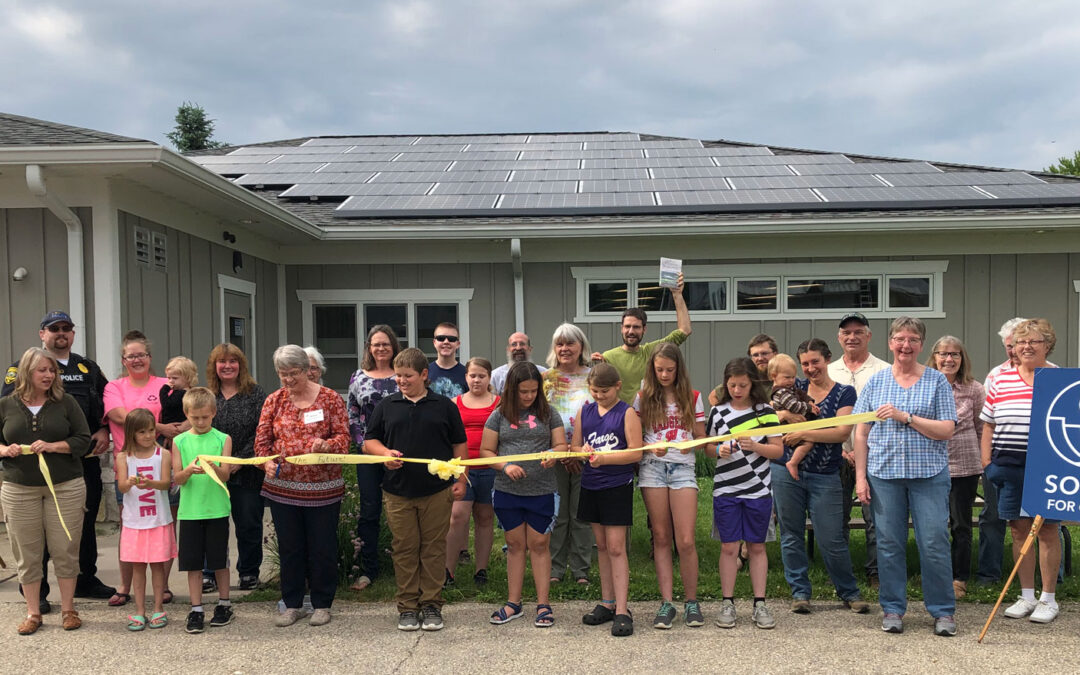
by Sam Dunaiski | Jun 8, 2022 | Community, Solar, Solar for Good
MADISON, WI – The Solar for Good grant program has awarded over $450,000 in grants and solar panel donations to Wisconsin nonprofit organizations. Thirty-five nonprofits will install over 2,200 kilowatts of solar electricity, leading to more than $6 million in renewable energy investments in Wisconsin.
The following organizations have been offered Spring 2022 Solar for Good grants to install new solar energy systems:
Agrace HospiceCare – health care, Janesville
Albany Lions Club – community services, Albany
Aldo Leopold Foundation – conservation, Baraboo
Antigo Public Library – community services, Antigo
City of Altoona – affordable housing, Altoona
Couleecap – community services, Westby
Curative Connections – human services, Green Bay
Dane County Humane Society’s Wildlife Center – conservation, Madison
Edgerton Retirement Apartments – affordable housing, Edgerton
Emmanuel Community United Methodist Church – religious, Menomonee Falls
Homeless Assistance Leadership Organization (HALO) – human services, Racine
Hawthorn Hollow Nature Sanctuary and Arboretum – conservation, Kenosha
Hunger Task Force – meal distribution, West Milwaukee
Lawrence University – education, Baileys Harbor
Madison Area Cooperative Housing Alliance (MACHA) – affordable housing, Madison
McFarland Lutheran Church – religious, McFarland
Milwaukee Teachers Education Association (MTEA) – education, Milwaukee
Movin’ Out – affordable housing, Cottage Grove
Mt. Calvary Lutheran Church – religious, Trempealeau
Northwest Side Community Development Corp – community development, Milwaukee
Outreach Community Health Center – health care, Milwaukee
Racine County Food Bank – meal distribution, Racine
Rivers and Bluffs Animal Shelter – animal shelter, Prairie du Chien
Rooted – agriculture, Madison
Southwestern Wisconsin Community Action Program – community services, Dodgeville
St. Mary Parish – religious, Omro
St. Robert Parish – religious, Shorewood
Tina’s K9 Rescue – animal shelter, Sparta
Trinity Episcopal Church – religious, Baraboo
Union Congregational United Church of Christ – religious, Green Bay
Vernon Economic Development Association – community services, Viroqua
Westcare Wisconsin – human services, Milwaukee
Wisconsin Housing Preservation Corp – affordable housing, Madison
Woodland Dunes Nature Center and Preserve – conservation, Two Rivers
*One organization has asked to remain anonymous at this time.
The grant recipients from the Spring 2022 round represent various sizes and types of nonprofits from across Wisconsin. Curative Connections, an organization that provides services to older adults with disabilities, will install a 280-kW ground-mounted solar array to offset nearly half of their electricity use. Over 80 solar panels will be installed on the rooftop of Outreach Community Health Center in Milwaukee to provide electricity for their medical, dental, and podiatry services. And Couleecap, an organization that works to fight poverty, will install two solar arrays at low-income housing facilities, directly offsetting the electricity use of their tenants.
“Without the Solar for Good Program, it would be difficult for low-income households to participate in solar programs that reduce energy costs and benefit their community,” says Hetti Brown, Executive Director of Couleecap. “The program is an important tool in our effort to reduce energy poverty for the rural residents of Wisconsin.”
Each organization agrees to highlight their solar project and provide education to their community about the benefits of solar energy as a requirement of their grant award.
“There are no publicly available solar installations within Langlade County, and we can offer tours for school children and the public,” said Dominic Frandrup, Director of the Antigo Public Library. “The long-term vision of the library is to also offer EV charging for downtown revitalization and eventually have an EV bookmobile to replace our gasoline van.
The 35 nonprofits are a part of Solar for Good’s 10th round of funding. The program has offered solar grants to 152 Wisconsin-based nonprofits since it began in 2017. Once projects are complete and energized, Solar for Good grant recipients will add over 7.3 megawatts of renewable energy to Wisconsin’s electric grid, providing enough electricity to power approximately 1,400 Wisconsin households.
_________________________________________________________________________________________________________________________________________
About Solar for Good RENEW Wisconsin’s Solar for Good initiative fosters the expansion of solar power among mission-based nonprofits and houses of worship in Wisconsin. Through a generous partnership with Couillard Solar Foundation, RENEW Wisconsin awards grants and solar panels to nonprofit organizations, helping them switch to clean, renewable, solar energy.
About Couillard Solar Foundation The Couillard Solar Foundation is a 501c3 nonprofit and our mission is to further the urgent path to decarbonization for Wisconsin, and create a cleaner, safer environment for everyone, regardless of socio-economic status. We help schools and nonprofits gain vital access to solar power, by providing solar panels, programs and education through the Solar for Good and Solar on Schools grant programs. For more information please visit www.CouillardSolarFoundation.org or follow on LinkedIn, Facebook, or Instagram.
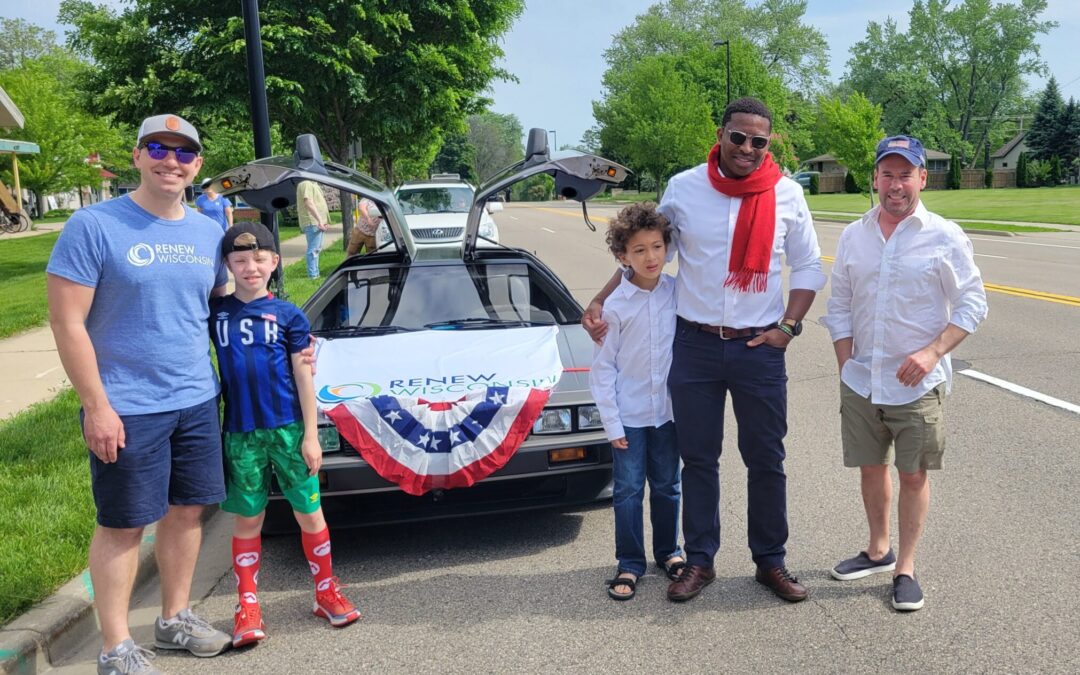
by RENEW Wisconsin | Jun 7, 2022 | Community, Electric Vehicles, RENEW Wisconsin
On Monday, May 30th, RENEW Wisconsin was honored to be able to participate in the Monona (WI) Memorial Day parade. Emerging Technology Director Francisco Sayu and Distributed Resources Director Sam Dunaiski were in attendance with their family members and a few large bags of candy.
The parade offered staff members a chance to get out and meet with members of the community and honor those Americans who gave their lives for their country.
“The parade was a good reminder of the sacrifices made to protect our people and our collective capacity for accomplishing great things,” said Sayu. “A simple – but meaningful – example of our ability to come together to celebrate our progress and envision a bright future – despite our differences.”
Friend of the organization, Geoff Hoffman, owner of Hoffman Manufacturing, offered his custom-redesigned, all-electric DeLorean to use as the RENEW vehicle for the parade. The car was an instant hit with many parade-goers, even before many realized it was an electric vehicle (EV).
“It was great to attend the parade again after a two-year COVID hiatus,” stated Hoffman. “This event is all about honoring the folks that have served and sacrificed for us.”
RENEW staff answered dozens of questions from the public about EVs and how using renewable energy for EV charging could help us achieve deep decarbonization of our transportation sector. More importantly, the parade offered an opportunity for staff to illustrate the benefits of a decarbonized economy for Wisconsinites.
“We need more opportunities to find common ground,” continued Sayu. “I enjoyed seeing so many different families coming together to share this experience.”
RENEW staff had a fantastic time at the parade and are incredibly grateful for the opportunity to participate. We hope we opened a few minds to renewable energy and electric vehicles, and we had a great time doing it!
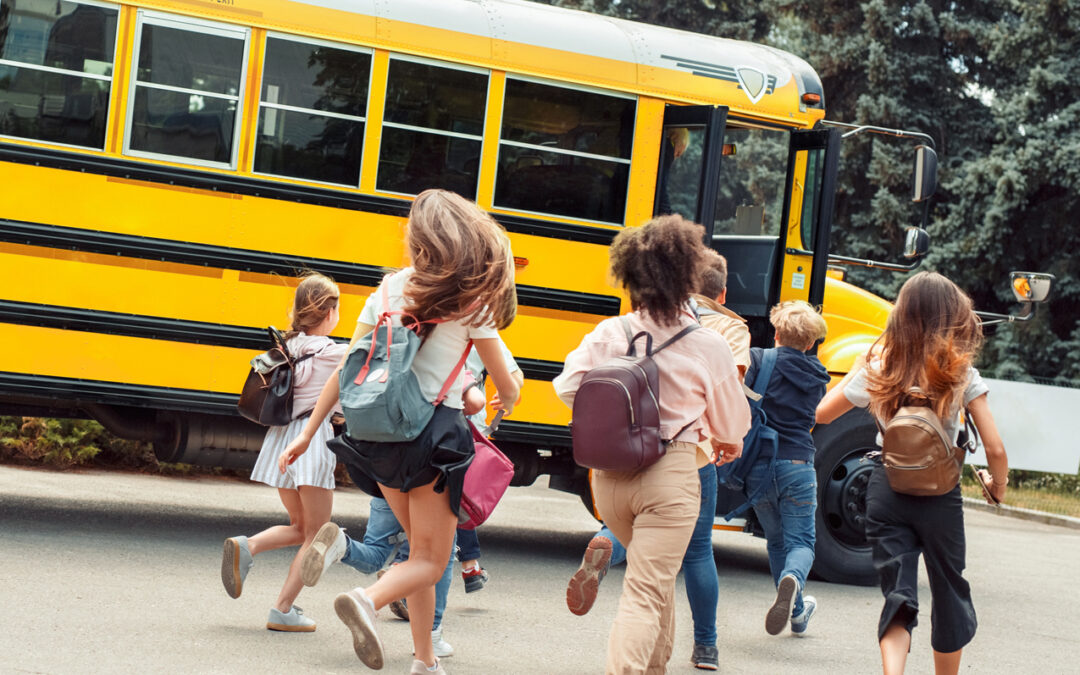
by Francisco Sayu | May 24, 2022 | Community, Electric Vehicles, Electrification, Local Government, Local Initiatives
The Infrastructure Investment and Jobs Act (IIJA), also known as the Bipartisan Infrastructure Law (BIL), was signed last November. It provides $5 billion to replace existing school buses with clean and zero-emission (ZE) school buses. This funding administered by the Environmental Protection Agency (EPA) can benefit school districts in Wisconsin by providing up to 100% of the cost of electric school buses, reducing transportation costs by 60%, and improving air quality throughout Wisconsin communities.
Why Clean School Buses?
School buses collectively travel over three billion miles each year, providing the safest transportation to and from school for more than 25 million American children every day. Exhaust from these buses harms human health, especially for children who have faster breathing rates than adults and whose lungs are not yet fully developed. The Clean School Bus Rebates (CSB Rebates) will fund the replacement of existing diesel and gas-powered buses with cleaner buses that result in better air quality, bus loading areas, and the community in general.
Cleaner buses such as those powered with electricity (electric buses) get the equivalent of 17 miles per gallon (MPG) compared to 6 MPG for diesel buses, providing average fuel and maintenance savings of $170,000 across the lifecycle of the bus. Wisconsin’s electric grid is increasingly powered by renewable energy sources like solar and wind. Transitioning away from diesel and gasoline to local – homegrown energy – will reduce air pollution and strengthen local economies.
2022 Clean School Bus Rebates Overview
The first $500 million of the Clean School Bus Program will be awarded as lottery rebates. The lottery will prioritize applications from low-income, rural, tribal, and/or high-needs school districts. Nearly 200 Wisconsin school districts are on the priority list. School Districts can receive up to $375,000 rebate per school bus (up to 25 buses per district) and $20,000 for EV chargers. The deadline to apply for this year’s rebate program is August 19, 2022.
Important Dates
| Activity |
Date |
| Online application. Submissions here |
May 20, August 19, 2022 |
| EPA reviews applications and begins the selection process |
September 2022 |
| EPA notifies applicants of selection and posts selectees online. Selectees can proceed with purchasing new buses and eligible infrastructure. |
October 2022 |
| Selectees submit Payment Request Forms with purchase orders |
October 2022 – April 2023 |
| Deadline to receive new buses, install EV chargers, replace old buses, and submit final documentation. |
October 2024 |
Eligible Applicants
The following entities are eligible to apply for EPA school bus rebates:
- State and local governmental entities provide bus services, such as public school districts, including charter schools, with an NCES District ID.
- Eligible contractors such as for-profit or nonprofit entities that can sell or finance clean or ZE school buses or related charging infrastructure to school bus owners.
- Nonprofit school transportation associations
- Indian tribes, tribal organizations, or tribally controlled schools are responsible for purchasing school buses or providing school bus service for a Bureau of Indian Affairs (BIA) funded school.
To be eligible for replacement, old school buses must:
- Have a Gross Vehicle Weight Rating (GVWR) of 10,001 lbs. or more
- Be operational at the time of application submission – Able to start, move in all directions, and have all operational parts
- Have provided bus service to a public school district for at least three days/week on average during the 2021/2022 school year at the time of applying, excluding COVID-related school closures
- If selected for replacement, a fleet can either:
- Scrap 2010 or older internal combustion engine buses; or
- Scrap, sell or donate 2011 or newer internal combustion engine buses.
Eligible replacement buses must meet the following criteria:
- Have a battery-electric, CNG, or propane drivetrain
- Be EPA certified vehicle model year 2021 or newer
- Have a Gross Vehicle Weight Rating (GVWR) of 10,001 lbs. or more
- Not be ordered before receiving official notification of selection for EPA funding
- Be purchased, not leased or leased-to-own
- Serve the school district listed on the application for at least five years from delivery.
For questions about eligibility, please contact cleanschoolbus@epa.gov.
Selection Process and Prioritization
The Clean School Bus Program prioritizes high-need school districts. Applicants that serve a prioritized school district will be offered more funding per bus and receive preference in the selection process.
Here is a list of prioritized school districts in Wisconsin.
Schools may also contact RENEW at info@renewwisconsin.org, for more information.

by Guest Blog | May 23, 2022 | Community, Community Solar, Solar
Cory Neeley
Director, SolarShare WI Cooperative
This year’s theme for Earth Day was “Invest In Our Planet.” There are many ways to invest in our planet, and I’m excited to announce a brand-new opportunity created in part by RENEW that allows everyday people to invest in Wisconsin’s clean energy economy.
SolarShare WI Cooperative is an innovative cooperative model that helps Wisconsin residents and businesses invest in solar cooperative farms. Working together, our members pool money to invest in solar farms located in Wisconsin, reducing our reliance on imported fossil fuels and strengthening our economy with stable, affordable, renewable energy for our local utilities.
How does SolarShare WI Cooperative Work?
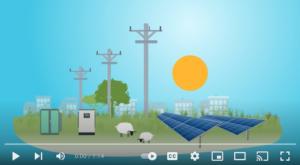
SolarShare WI Cooperative works with Wisconsin-based member contractors to finance, build, operate and maintain the cooperative solar farms, creating family-supporting jobs in Wisconsin and reducing our reliance on energy from outside the state. Profits from the sale of our clean energy are returned to members as dividends, multiplying the economic benefit of our projects.
Cooperative action is woven into the fabric of rural Wisconsin and allows small groups of people to achieve great things. Whether pooling dairy or providing electricity, cooperatives play crucial roles in Wisconsin communities.
Wisconsin imports 14 billion dollars’ worth of non-renewable energy each year. We can keep more of our energy dollars in Wisconsin by working together to invest in local renewable energy.
We plan to build solar farms across the state, partnering with local communities and utilities to provide cost-effective renewable energy while providing financial opportunities to Wisconsin citizens and ratepayers. The investment we make in cooperative solar farms is an investment in our state and, ultimately, our planet.
Please join us at SolarShare WI Cooperative for more information.







